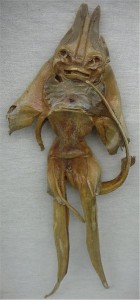 We were asked to contribute a post to Sounding Out! They do great work in furthering the discussion of sound studies and issues relating to the cultural manifestations of sound. In honor of World Listening Day and World Listening Month, we created a guest blog post/episode about the process of creating our show and how our show encourages listening, acknowledgement, and enjoyment of sound. Check it out!
We were asked to contribute a post to Sounding Out! They do great work in furthering the discussion of sound studies and issues relating to the cultural manifestations of sound. In honor of World Listening Day and World Listening Month, we created a guest blog post/episode about the process of creating our show and how our show encourages listening, acknowledgement, and enjoyment of sound. Check it out!
Author Archives: Craig
32: 52 Hz
A mysterious 52 Hertz signal was first heard in the North Pacific in the late 1980’s. It had the characteristics of a whale call, but it was a higher frequency than what is typical for baleen whales. After years of detecting the signal on hydrophone recordings, scientists have still never seen the whale and are unsure whether it’s a hybrid species or a blue or fin whale that has a problem with its sound production. The 52 Hz whale has often been referred to as “The World’s Loneliest Whale,” because people think that other whales couldn’t understand it’s unique call. Learn more about the 52 Hz whale, underwater communication, whale tracking, and why this whale may not be as lonely as previously assumed from Darlene Ketten of the Woods Hole Oceanographic Institution, Bruce Mate of Oregon State University’s Marine Mammal Institute, and Orla O’Brian.
Read William A. Watkins’s 1999 and 2004 papers mentioning 52 Hz or click here to find an online memoriam for this man who helped discover an share the earliest information on 52 Hz.
Bruce Mate will be assisting with the documentary titled, “Finding 52: The Search for the Loneliest Whale in the World.” The search for 52 Hz will begin next fall.
Music in this episode was composed by Mustafa Shaheen. You can hear the songs on his music page.
- George feeling queezy aboard the Cetacea
- A blue whale ear next to harbor porpoise ears at WHOI
If you’re interested in seeing a clip of Pinball the humpback whale, a YouTube user uploaded this clip from the day we went on a whale watch:
Thanks to Rachael McDonald from KLCC for recording assistance with this episode and to Boston Harbor Cruises and the crew of Cetacea.
This production is part of the STEM Story Project, with support from the Alfred P. Sloan Foundation. Presented by PRX, the Public Radio Exchange.
31: Not in the Kitchen Anymore
Jenny Haniver has been a gamer as long as she can remember. When she and her husband bought an XBOX 360 they began to dive into the world of online gaming. While she was playing, Jenny began noticing other gamers’ reactions to her. She began recording those interactions and used them for an art installation and eventually for her website, Not in the Kitchen Anymore. Learn about how these recordings of online gaming are opening up a discussion on gender issues in the gaming community.
Sponsored by
Sound Studio for Mac: Pro audio recording without the price.
As we noted in the episode, “Jenny Haniver” is a pseudonym. That was the name given to an airship in the Mortal Engines Quartet book series by Phillip Reeve. Jenny Hanivers also refer to dried out skates or rays that sailors would try to make into mermaids or other forms and sell to other sailors and tourists.
If you’re so inclined, here is what a Jenny Haniver looks like:
Episode Photo by Flickr user Sklathill




